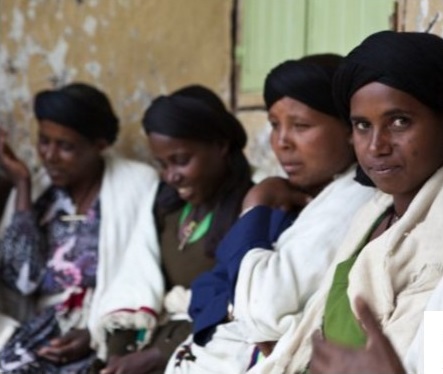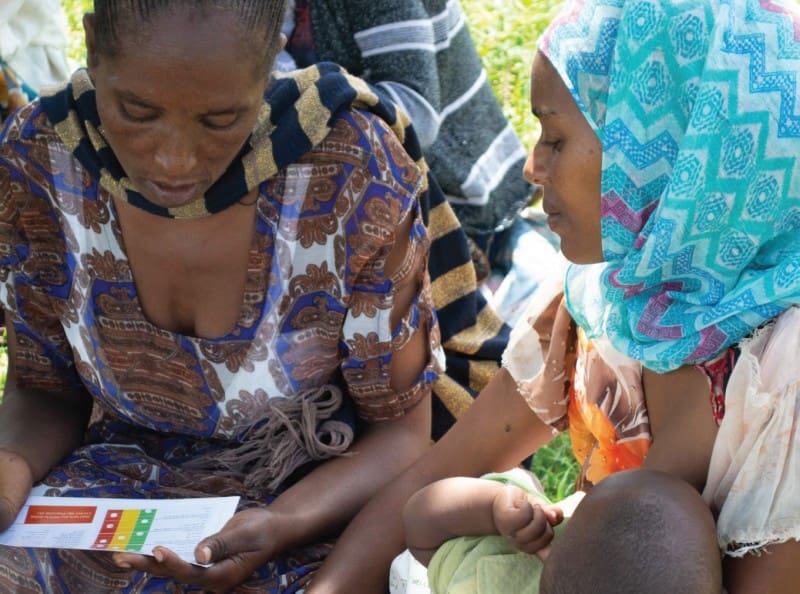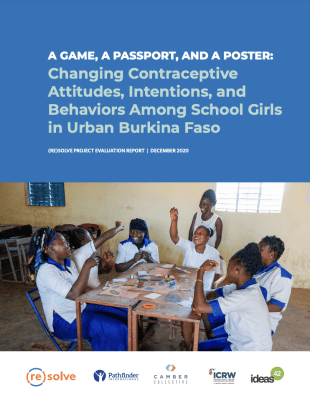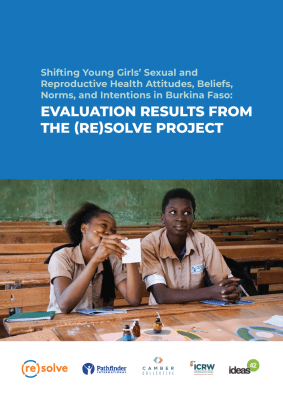
(Re)Solve Family Planning Program
2016 - 2020
Bill and Melinda Gates Foundation
Bangladesh ,Burkina Faso ,Ethiopia
Abortion, Family Planning, Sexual and Reproductive Health and Rights
Pathfinder International, Camber Collective, ideas42
Laura Hinson
 The (re)solve project was designed to generate and rapidly test innovative solutions to address behavioral barriers and increase women and girl’s use of modern contraception in Burkina Faso, Ethiopia and Bangladesh. To complete the work, Pathfinder International brought together a consortium of partners including ICRW, Camber Collective and ideas42.
The (re)solve project was designed to generate and rapidly test innovative solutions to address behavioral barriers and increase women and girl’s use of modern contraception in Burkina Faso, Ethiopia and Bangladesh. To complete the work, Pathfinder International brought together a consortium of partners including ICRW, Camber Collective and ideas42.
In each of the three countries, Camber began with an audience segmentation process for the target populations of interest. Next, ideas42 conducted a rapid assessment of the target population, and developed solutions to address behavioral barriers to accessing and using modern contraceptive methods for each unique population.
- In Burkina Faso, (re)solve worked with unmarried, in-school youth in Ouagadougou and Bobo-Diolasso;
- In Ethiopia, the team is working with post-partum women in the Tigray region; and
- In Bangladesh, the team worked with contraceptive clients attending select Marie Stopes Clinics in Dhaka.
In each country, through rapid and iterative testing of these solutions, the (re)solve team discovered which solutions best supported women and girls to use modern methods.
![]()
What Did We Set Out to Do?
ICRW’s primary role on the consortium was as the research partner. We developed evaluation plans for the interventions (i.e., solutions) designed to address women and girls’ unmet need for contraception in all three countries. ICRW also led the consortium’s internal monitoring and learning agenda, aimed at understanding how partners adapted these solutions as the consortium discovered what works or not to change intentions, attitudes and behaviors related to contraception. ICRW worked closely with Pathfinder to capture and disseminate knowledge about the process by which these solutions were adapted.
![]()
What Methods Did We Use?
ICRW developed rigorous mixed-methods cluster randomized control trial designs in each of the three countries; however, due to COVID and civil unrest, the evaluation work was only completed in Burkina Faso.
In Burkina Faso, our main goal was to assess the extent to which exposure to an intervention—in this case, a facilitated board game and health passport aimed at getting adolescent girls (in the equivalent of 9th and 10th grade) to health facilities—changed girls’ SRH attitudes, beliefs, intentions and behaviors.
We conducted data collection as such:
- Baseline with a cohort of 2, 372 girls (quantitative) from intervention and control schools and 48 girls (qualitative) from intervention schools
- Midline with 1,144 girls (quantitative) from intervention schools
- Endline with 2, 072 girls (quantitative) and 41 girls (qualitative) from the baseline cohort. In addition, we conducted 35 in-depth interviews with implementation staff and 14 key-informant interview with community stakeholders.
Overall, ICRW and the (re)solve team will generate much-needed knowledge about how various interventions addressing unmet need can be rapidly tested and then adapted to new populations and contexts.
![]()
Our Conclusions and Reports:
Specifically, in Burkina Faso, we saw greater shifts in SRH attitudes and beliefs in girls who played the game and received a passport, as compared to girls in control schools. Many intervention-school girls went to a health facility after exposure to the intervention, and there was a positive impact on intention to use contraception in the next three months (although it was not statistically significant).

Shifting Postpartum Women’s Sexual and Reproductive Health Attitudes, Beliefs, Norms, and Intentions in Tigray, Ethiopia: Evaluation Results from the (Re)Solve Project
Download Report
Against All Odds: A Mixed-Methods Evaluation of a Behavioral Postpartum Family Planning Intervention in Tigray, Ethiopia
Download Report

